Books
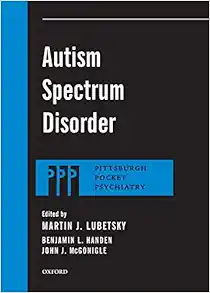 Lubetsky MJ, Handen BL, McGonigle JJ, Lubetsky. Autism Spectrum Disorder (Pittsburgh Pocket Psychiatry Series). Oxford University Press; 2011
Lubetsky MJ, Handen BL, McGonigle JJ, Lubetsky. Autism Spectrum Disorder (Pittsburgh Pocket Psychiatry Series). Oxford University Press; 2011
An excellent pocket-sized guide that takes complicated subject matter and boils it down to quickly learnable material. The book begins with history, evaluation and scientific background before shifting to treatments. Clearly written in a user-friendly format; includes multiple choice questions and reading lists.
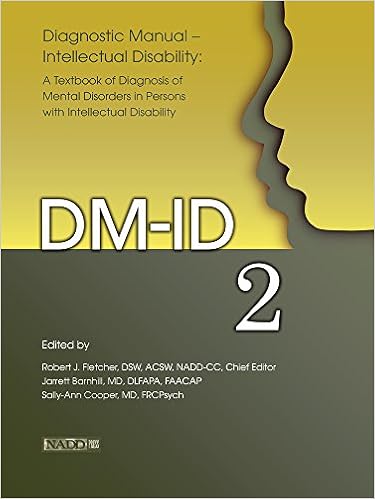 Fletcher R, Barnhill J, Stavrakaki C, Cooper S. (Eds.). (2016). Diagnostic
Manual - Intellectual Disability (DM-ID-2): A Textbook of Diagnosis of
Mental Disorders in Persons with Intellectual Disability. Kingston, NY:
NADD Press. 2017
Fletcher R, Barnhill J, Stavrakaki C, Cooper S. (Eds.). (2016). Diagnostic
Manual - Intellectual Disability (DM-ID-2): A Textbook of Diagnosis of
Mental Disorders in Persons with Intellectual Disability. Kingston, NY:
NADD Press. 2017
Successful treatment starts with the correct diagnosis and this diagnostic manual serves as a cross-reference for using DSM-5 criteria for those with intellectual disability and co-occurring psychiatric disorders. It is organized in a similar manner to DSM-5 making it an easy cross-reference to use.
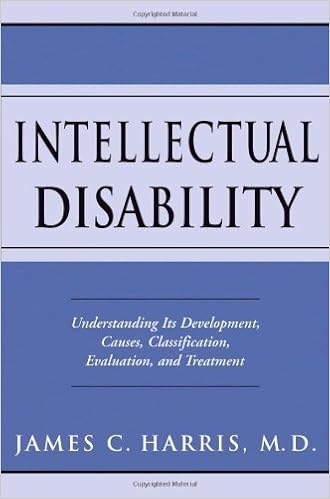 Harris JC. Intellectual Disability: Understanding Its Development,
Causes, Classification, Evaluation and Treatment (Developmental
Perspectives in Psychiatry). New York, NY: Oxford University Press,
2005
Harris JC. Intellectual Disability: Understanding Its Development,
Causes, Classification, Evaluation and Treatment (Developmental
Perspectives in Psychiatry). New York, NY: Oxford University Press,
2005
This is a comprehensive text on intellectual disability. Dr. Jim Harris has spent his career dedicated to the science and care of individuals with ID (IDD) and pools that wealth of knowledge and the breath of the field into a textbook. This books covers the history of intellectual disability in society, the growth in understanding of its causes and forms, and its treatments.
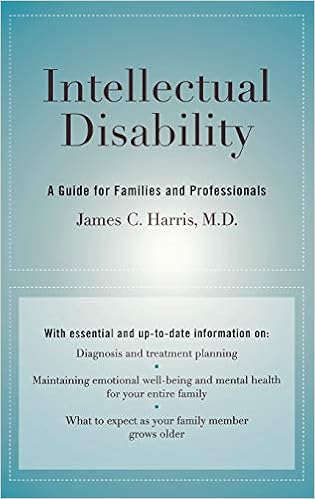 Harris, JC. Intellectual Disability: A Guide for Families and Professionals, New York, NY, Oxford University Press, 2010
Harris, JC. Intellectual Disability: A Guide for Families and Professionals, New York, NY, Oxford University Press, 2010
Intellectual Disability: A Guide for Families and Professionals, by one of the country's foremost authorities on intellectual disability, is a comprehensive resource that will be of importance to anyone with a personal connection to a child or adult with a neurodevelopmental disorder.
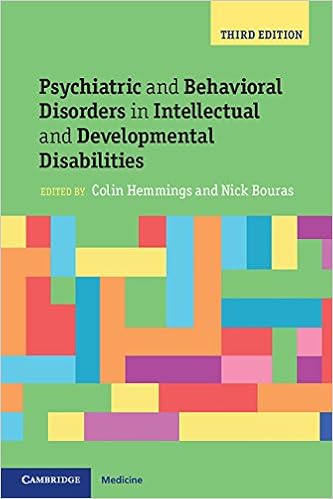 Hemmings, C. & Bouras, N. (Eds.). (2016). Psychiatric and Behavioral Disorders in Intellectual and Developmental Disabilities. Cambridge, United Kingdom: Cambridge University Press.
Hemmings, C. & Bouras, N. (Eds.). (2016). Psychiatric and Behavioral Disorders in Intellectual and Developmental Disabilities. Cambridge, United Kingdom: Cambridge University Press.
An award-winning summary text with each chapter by experts covering different aspects of clinical care in ASD/ID. These include the history of ASD/ID, assessment instruments, psychiatric diagnoses, interface of medical and psychiatric disorders, epilepsy, psychopharmacology, behavioral interventions, treatments, offending behavior and caregiver experiences. Key summary points and references are provided at the end of each chapter.
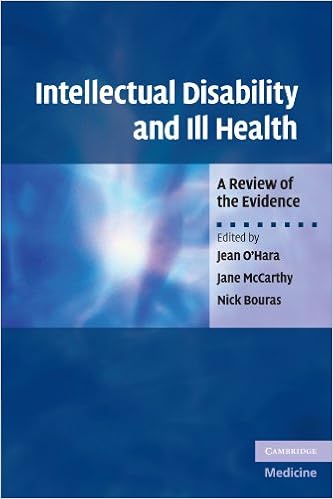 O’Hara J., McCarthy J., Bouras, N. (Eds). (2010). Intellectual Disability and Ill Health: A Review of the Evidence. Cambridge, United Kingdom: Cambridge University Press
O’Hara J., McCarthy J., Bouras, N. (Eds). (2010). Intellectual Disability and Ill Health: A Review of the Evidence. Cambridge, United Kingdom: Cambridge University Press
A comprehensive but succinct text providing the clinician a practical evidence-based approach to medical problems that can masquerade as behavioral/psychiatric problems. Chapters include health care in ID/ASD, congenital causes of ID/ASD, epilepsy, disorders of environmental origin, neurodegenerative diseases and dementia, diseases of body organ systems, including dental and oral, eye, ENT, and gastrointestinal systems.
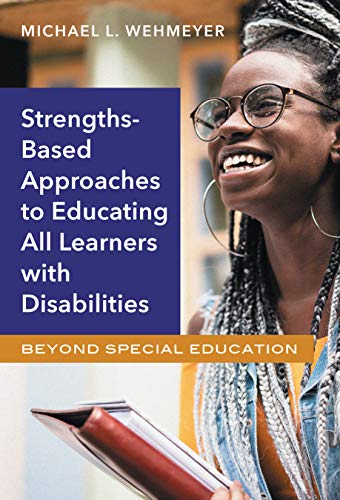 Wehmeyer M. (2019) Strengths-Based Approaches to Educating All Learners with Disabilities: Beyond Special Education. New York, NY: Teachers College Press.
Wehmeyer M. (2019) Strengths-Based Approaches to Educating All Learners with Disabilities: Beyond Special Education. New York, NY: Teachers College Press.
This book provides a framework for innovations in the education of scholars with (and without) disabilities, including pers-nalizable approaches and self-determined learning. The strengths-based approach aims to move education away from diagnoses and remediation to schoolwide instruction and digital approaches for all students, to prepare them for the 21st-century world.
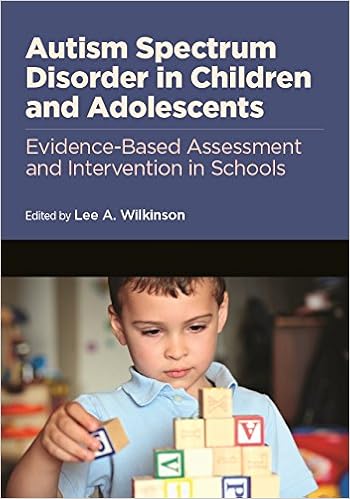 Wilkinson LA. Autism Spectrum Disorder in Children and Adolescents: Evidence-Based Assessment and Intervention in Schools. Washington: American Psychological Association; 2015.
Wilkinson LA. Autism Spectrum Disorder in Children and Adolescents: Evidence-Based Assessment and Intervention in Schools. Washington: American Psychological Association; 2015.
The author uses her knowledge as a school psychologist and cognitive-based therapist to write a text that describes the evidence-based practices of assessment and intervention in the classroom. This has a special emphasis on the higher-functioning individual with ASD. This book also helps to provide insights into the working of the schools and how each member’s role plays out with the child.
(back to top)